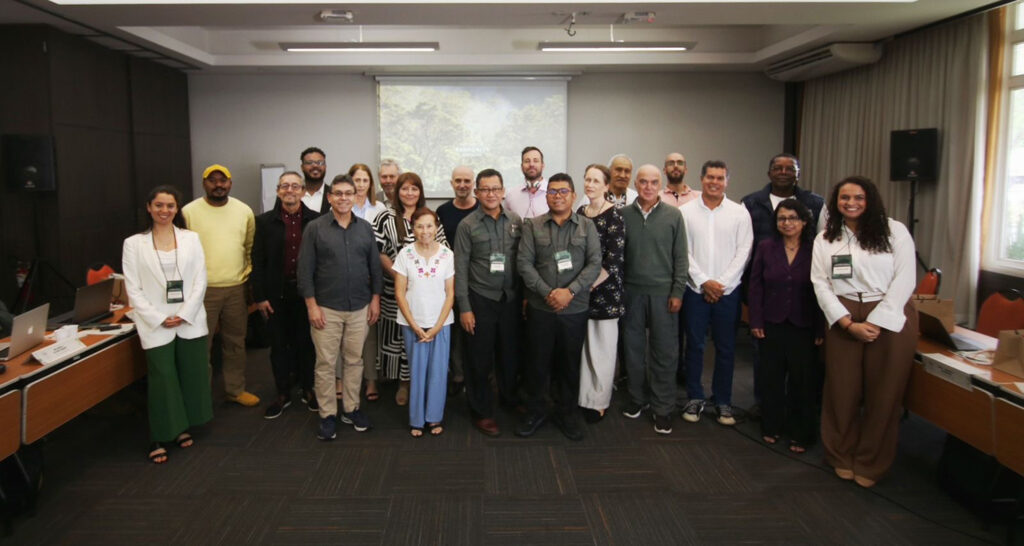The IRI-Colombia national team participated in the Second IRI Learning Exchange, held in São José dos Campos (Brazil), a meeting led by the Interfaith Initiative for Tropical Forests at the global level (IRI), whose objective is to strengthen the capacities of IRI’s national programs around the world. through collective learning, the result of reflection on experiences and lessons learned.
From 24-29 April, representatives from IRI’s programmes in Brazil, Colombia, Indonesia, Peru and the Democratic Republic of Congo shared some of the most successful strategies they have developed and reflected on achievements and challenges.
“The idea of IRI is to bring together religious leaders with existing allies to reverse the state of the forests,” said Joseph Corcoran, director of the global program, who addressed IRI’s theory of change on the first day of the dialogues.
Likewise, throughout that day, each of the national teams presented important data on topics such as the religious composition of their country, the political division and the situation of deforestation, with the purpose of offering an overview of their national context and how it led to the formulation of a specific strategy.
During the second day of discussions, topics such as training processes, holding high-level briefings with faith-based organizations to integrate tropical forests and the IRI program were addressed; and the development of religious teaching guides on forests, climate and indigenous peoples’ rights.
For its part, IRI-Colombia presented its territorial intervention strategy through the creation and management of local chapters in the areas of the Amazon most affected by deforestation; as well as its communications strategy that, in recent years, has allowed it to reach more than one million people through different channels.
“A georeferencing exercise provided us with the inputs to identify the municipalities where it was a priority to promote the joint and articulated action of religious, social and community leaders, with the purpose of raising awareness about the deforestation crisis, inspiring action to restore the Amazon ecosystem and influencing the adoption of public policies aimed at protecting the Amazon,” highlighted Blanca Lucía Echeverry, national coordinator of IRI-Colombia.
The third and fourth days focused on topics such as the mobilization of pastoral action in favor of the defense of territories and the security of indigenous peoples; mobilizing faith communities to support calls to action for forest, climate, and indigenous peoples’ policymakers; the holding of national conferences; partnering with key ministries and parliamentarians; and the development of advocacy processes with local governments. This is the case of IRI Colombia, which since August of last year has been developing an advocacy process at the local and regional level, the first phase of which consisted of holding debates with the then mayoral and gubernatorial candidates. The main result of this part of the process was the signing of the programmatic agreement “A New Window of Hope for the Amazon”, in which they pledged that, once elected, they would include in their development plans programs and policies aimed at protecting the Amazonian tropical forests.
In addition, participants reflected on the role and contribution of advisory councils; the opportunities offered by participation in global events such as the COP 16 on biodiversity to be held this year in Colombia; and the creation of a shared vision for the future growth and sustainability of the Initiative in the five countries.
Immersive experience
The first part of the IRI Learning Exchange consisted of an immersion exercise, in which participants came as observers to an IRI Brazil training process, aimed at a group of evangelical religious leaders from this country.
For two days, both leaders and representatives of IRI’s national programs visited the facilities of the Center for Monitoring and Early Warnings of Natural Disasters and the National Institute for Space Research (CEMADEN and INPE), where they learned first-hand how natural disasters are monitored in the risk areas of more than 950 Brazilian municipalities classified as vulnerable; the relationship between natural disasters and climate change; development in the production of satellites; the forest and forest loss monitoring system; and the relationship between deforestation and climate change.
In addition, the formation process led by IRI Brazil included a conference on Protestantism and ecology, by theologian David Lago, and the CBVida Environmental conference, where Pastor Marquinhos of the Baptist Church presented the experience of his community in the field of creation care, which has been advised by IRI Brazil.


